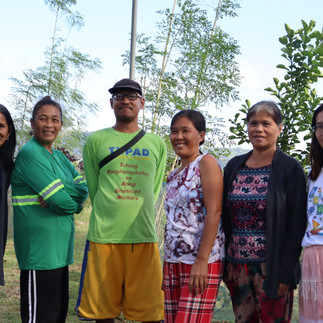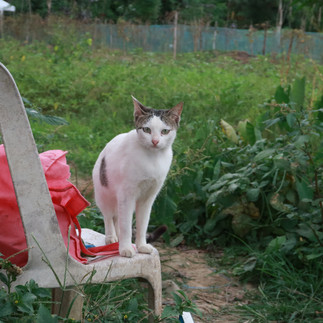New Greenland: Thriving Urban Farm in Barangay Bagong Silangan, Quezon City
- Group 3
- Feb 5, 2024
- 7 min read

“Makakasustain ka pa sa [environment] at safe ka pa kasi alam mo kinakain mo kasi tanim mo,” said Mrs. Lilio on why other municipalities should initiate urban farming, she explained.
In the concrete expanse of Quezon City, a groundbreaking initiative is flourishing, challenging traditional notions of farming and land use. New Greenland Farm, the city's pioneer agricultural cooperative, is not just a patch of soil; it is a transformative force providing a lifeline of income to selected residents. The New Greenland Farmers Agricultural Cooperative is the first and largest urban farming cooperative in Quezon City which was organized through the assistance of the Quezon City Local Government Unit.
Established through LGU’s initiative, led by Mayor Joy Belmonte, the farm emerged after the destruction of the land caused by typhoon Ulysses leaving the land completely washed out. In collaboration with the Department of Agrarian Reform (DAR) and barangay officials, Greenland farm served as a learning space on cultivating not only crops, but also knowledge in urban farming. This approach aligns with the city's commitment to addressing daily needs sustainably.
Miles Lilio, the Director and Chairperson of Livelihood in the New Greenland Farm, spearheads and works to ensure that Brgy. Bagong Silangan’s farmers and cooperative members have sustainable sources of income for their livelihood.
“Kung sino ang willing [na sumali], kasi hindi mo pwedeng i-force ang mga tao, kasi kung i-foforce mo ang mga tao na sumali at hindi bukal sa loob nila, hindi magiging maganda ang samahan,” Lilio said mentioning that farmers who cultivate the farm are all volunteers who agreed to come forward in contributing to the greater good of the community.
Lilio also mentioned that everyone is welcome to be a part of the farming community as long as they are willing to learn and participate in seminars and training necessary in obtaining knowledge about urban farming.
Responding to the lockdown's disruptions, the city strategically introduced nutritious urban garden distributions, supporting food security. New Greenland Farm ensures a steady supply of leafy vegetables available for purchase to wholesale buyers and ambulant vendors for a lesser amount compared to normal market suppliers’ price.
The primary objective of this project is to provide sustainable livelihoods for the farmers residing in New Greenland. Cultivating an impressive variety of green vegetables such as saluyot, alugbati, Chinese water cabbage, cabbage, eggplant, petchay, malunggay, gabi, squash, bitter gourd, lady finger, lettuce, and other leafy vegetables, the farmers ensure a steady supply to meet their daily needs.
“Makaka-sustain ka pa sa [environment] at safe ka pa kasi alam mo kinakain mo kasi tanim mo,” said Mrs. Lilio on why people in the community should initiate urban farming, she explained.
Lilio, the director, and chairperson of the Savings Committee reveals a profit-sharing model that distinguishes New Greenland Farm's cooperative structure. Cooperatives receive 30% goes to the rights owner, leaving a substantial 70% directly supporting the keen farmers.
But a farmer’s life is not always as green as the pasture; at times, bad roots happen.
Maintaining a 10-hectare land needs several green thumbs to work together, something New Greenland Farm used to have until when people had to go back to their new-normal lives after years of staying at home due to the pandemic.
More than a hundred individuals including mothers, fathers, and students who lost their jobs and studies because of the pandemic, gathered to plant on their land parcels and divided themselves into groups like Team Lipad, Team Pitas, and Team Lakad. But only 50 farmers continued working in the now generalized farm as Mrs. Lilio said.
“Noong nag-back to normal na tayo, face-to-face, ‘yung mga estudyante (pumasok) na. Mga tatay, (pumasok) na rin. ‘Yung ibang nanay pumasok na rin. ‘Yan, naging kaunti na lang ‘yung (farmers). Pero name-maintain naman nila ‘yung pagtatanim,” said the president.

View inside the Farm [Photo by Mian Centeno]
Urban Farming: Seeds of Change
Like many developing areas around the globe, Quezon City in the Philippines faces the complex burden of pervasive malnutrition combined with growing rates of obesity. Mayor Joy Belmonte recognized the importance of urban farming in addressing hunger and providing low-income households with access to nutritious food. Since 2010, the city has supported the establishment of over 160 organic farms in various locations such as backyards, daycare centers, churches, and communal spaces under the "Joy of Farming" initiative.
An initiative was launched to address food security concerns and develop strategies to enhance the city's self-reliance during times of crisis, such as pandemics or natural disasters. Urban farming is an essential aspect of both.
Belmonte's office works together with the Department of Agriculture, supporting national food-security initiatives. In addition, households and organizations that have access to vacant lots receive assistance from the city government to create their own urban farms. This includes providing them with necessary tools, seedlings, and training.
As of January 2024, there are 1,026 farms around Quezon City, which helps food security and promotes a healthy diet for about 3 million residents, according to the Quezon City Climate Change and Environmental Sustainability Department (QC-CCESD). The city also has an action plan for climate change, which includes food supply as one of their proposed actions.
“The city has a roadmap to achieve its climate change mitigation and adaptation goals which is our Enhanced Local Climate Change Action Plan 2021-2050. Since Food Security is one of the concerns when talking about climate change, one of the key strategies to be implemented by the City is the promotion of Urban Farming and Localized Food Production.”
As a signatory to the C40 Good Food Accelerator, the urban area plans to establish more farms to support the population by encouraging residents. “For instance, the City enacted the Idle Land Tax wherein lot owners who wish to use their land for urban agriculture, are exempted from paying the Idle Land Tax,” QC-CCESD said.
As per the QC-CCESD, urban farming benefits the environment since food waste can be a soil compost, and since food availability is closer, transport emissions are reduced.

Ferlita Daelto, lead farmer in New GreenLand Farm [Photo by Patricia Azicate]
Through the roots of struggle
The farmers have faced natural disasters like flooding and drought as their crops grow. After Typhoon Ulysses, they were taught to leave the affected crops in the meantime in hopes of recovering their state and not putting them to waste, similar to what they did during New Greenland Farms’s earlier days of facing flood.
“Noong first pa lang no’ng 2021, bago kami mag-harvest, kaka-organize pa lang nito, binaha (kami). (…) Mataas ‘yong baha. ‘Yan din ‘yong challenges ng manananim—pagbaha,” said Mrs Lilio.
Plenty of water is not right for the crops, and so is too much heat. When dry season strikes, only two wells, one with an electric pump and the other manually operated, suffice their need for the right amount of water.
The struggle to irrigate the 10 hectare land, the lack of manpower, natural disasters, heat exhaustion, and other factors contributed to their challenges as farmers in the middle of a busy city, but their hardships did not end their dreams.
Despite hurdles, Ferlita Daelto, the lead farmer in the New Greenland Farm, triumphs through communication and cooperation with fellow farmers, highlighting the resilience ingrained in Greenland Farm's community spirit.
Beyond its agricultural role, New Greenland Farm attracts visitors from various regions with the purpose of gaining knowledge about urban farming. Its appeal serves as a marketing platform for small farmers nearby, resulting in enhanced revenue and further strengthening its position as a community model in Quezon City.
“Kahit na sabihin mong wala kang space na malaki pwede ka naman sa vertical. sa rooftop pa lang pwede na. … Makakasustain ka pa sa ano [environment] at safe ka pa kasi alam mo kinakain mo kasi tanim mo,” Lilio said.
Expressions of interest from individuals looking to convert their lands into urban farms showcase the transformative potential of New Greenland Farm, setting the stage for a future where urban agriculture becomes customary.

Severino Tores Sablay, pioneer in New GreenLand Farm [Photo by Patricia Azicate]
From a pioneer’s perspective
Severino Tores Sablay, 75, the eldest farmer in the New Greenland Farm recalled how the development of the farm started back in 2021. He mentioned that they started as a small urban farming group with 42 rights owners in Brgy. Bagong Silangan named Samahan ng Manananim ng Gulay ng New Greenland in which he served as the Vice President.
“[Noong mag-umpisa kami], parang grupo lang po namin ng manananim pero kami ang original 42 rights owners. Ngayon, no’ng nakita na maluwag na, [tumanggap] kami [dahil pandemic] ng mga gustong magtanim-tanim dito. Kahit na walang rights, pwede kami tumanggap para naman… ‘di naman sila makalabas, ang mga asawa ay nasa trabaho. Iyon naman ang order ng city, para mapalaganap ang programa ng city na urban farming. Hindi lang sa may rights kundi lahat ng interesado,” Sablay said.
He also mentioned that Quezon City LGU extended their help to the farmers on the process of establishing the farm during the pandemic through giving weekly relief goods to the farmers such as canned goods and handing out financial aids to the original 42 rights owners used in enhancing their livelihoods.
Sablay, as the “father” of the farm, is optimistic about the proposed projects of Brgy. Bagong Silangan in collaboration with Quezon City LGU has the plan of turning New Greenland into an Agri-Tourism Park and hopes that these advancements will benefit not only the farmers, but their whole community as well.

Kap. Cara sharing the Barangay’s Aspirations on Urban Farming [Photo by Patricia Azicate]
Reaching the top of the beanstalk
In a recent interview, Barangay Bagong Silangan Captain, Wilfredo Cara, expressed his aspirations for the continuous development of Greenland, a growing community under his leadership.
When asked about his vision for the area, Cara emphasized the importance of sustaining the progress already achieved. "We want it to be sustained continuously," he affirmed, underlining the need for ongoing efforts to further enhance New Greenland.
As the leader of the barangay, Cara's vision aligns with sustainable growth, community engagement, and leveraging the diverse opportunities presented by Greenland's evolving landscape. He also hinted at future projects, aiming to establish agri-tourism in the area.
The emphasis on agri-tourism aims not only to boost the local economy but also to create global connections, ensuring sustainable growth for Barangay Bagong Silangan.
GALLERY: Photos by Patricia Azicate, Mian Centeno, Timothy Milambiling






































Comments